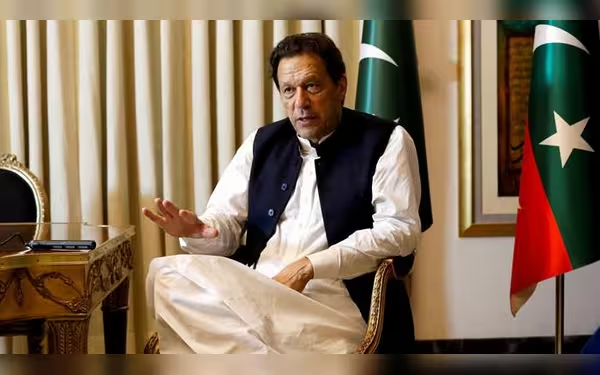Saturday, November 16, 2024 07:28 PM
Imran Khan's Candidacy for Oxford Chancellor Faces Controversy
- Petition claims Khan unfit for Chancellor role.
- Allegations of corruption and misconduct raised.
- Calls for reconsideration of Khan's candidacy.
 Image Credits: geo
Image Credits: geoA petition challenges Imran Khan's suitability for Oxford Chancellor, citing corruption allegations and political ambitions.
LONDON: The University of Oxford is currently facing a significant controversy regarding the potential candidacy of former Prime Minister Imran Khan for the position of Chancellor. A new petition has emerged, spearheaded by Khurram Butt, a UK activist associated with the Pakistan Muslim League-Nawaz (PML-N). The petition asserts that Khan's intentions are not aligned with the welfare of the university but rather serve his personal and political ambitions.
Butt has taken proactive steps by visiting the university to distribute leaflets and submit the petition, which includes new evidence against Khan. The core argument of the petition is that Khan is attempting to leverage the Chancellor's election for political gain, thereby dragging the prestigious institution into a web of controversy and political maneuvering.
One of the key points raised in the petition is the ongoing investigation by the UK National Crime Agency (NCA) concerning a £190 million case linked to Khan. The petition alleges that Khan has been involved in corruption both in Pakistan and the UK, raising serious ethical questions about his suitability for the Chancellor role. It states, "We believe that Khan’s candidacy is incompatible with the values and principles that guide this prestigious institution." This statement underscores the concerns surrounding Khan's past actions and their implications for the university's reputation.
The petition further details allegations of corruption against Khan, including his conviction for misappropriating state gifts. It highlights a specific incident where gifts valued at over $5 million, received from Saudi Arabia, were sold in the UAE grey market by Khan’s team after he acquired them for a mere $100,000. Such actions, according to the petition, reflect a pattern of exploiting state resources for personal gain.
Moreover, the petition references a Financial Times article that discusses illegal funding received by Khan's political campaigns from discredited individuals, such as Arif Naqvi. This raises additional concerns, as Pakistani law prohibits political parties from accepting foreign funding. The implications of these allegations are profound, as they not only tarnish Khan's image but also pose a threat to the integrity of the university.
Butt's video statement from outside Oxford University further emphasizes the gravity of the situation. He pointed out that Khan had previously resigned from his position as Chancellor of Bradford University due to student dissatisfaction regarding his unavailability. This history raises questions about Khan's commitment to fulfilling the responsibilities that come with the Chancellor role at Oxford.
In light of the serious accusations against Khan, including ongoing investigations and potential legal repercussions, the petition urges the Election Committee to reconsider his candidacy. The petition concludes with a strong call to action, stating, "We, therefore, urge the Election Committee to seriously reconsider his candidacy and withdraw his name from consideration for the role of Chancellor." This plea reflects the broader concerns about the impact of Khan's potential appointment on the university's reputation and values.
As the situation unfolds, it is crucial for the University of Oxford to carefully evaluate the implications of Khan's candidacy. The integrity of educational institutions is paramount, and any association with individuals facing serious allegations of corruption and misconduct could have lasting repercussions. The outcome of this petition may not only shape the future of the Chancellor position but also set a precedent for how universities engage with political figures and navigate the complexities of public perception.













